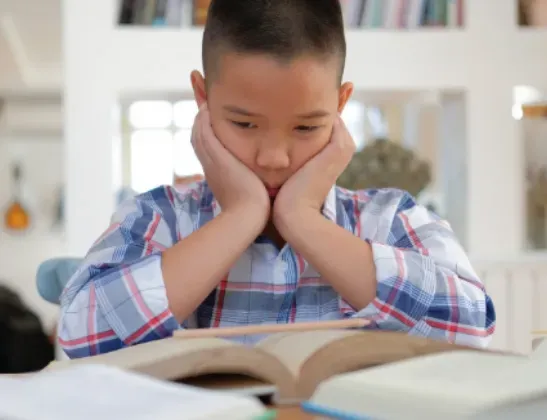The Connection Between Sleep and School Performance
Mon May 15 2023
- Sleep Tips
Sleep plays a crucial role in the well-being of individuals, particularly children who need sufficient rest to thrive. While it is widely recognized that a lack of sleep or poor sleep quality can directly impact a child’s performance at school, what is less known is that the sleep habits developed during infancy can lead to behavioral and health problems later in life.
Understanding this connection is essential for parents and caregivers in order to optimize their children’s sleep patterns and ultimately set them up for long-term success. In this article, we will explore the correlation between sleep and school performance, as well as provide actionable tips to improve sleep for children.

Sleep Difficulties in Infants
Many infants and young children experience sleep difficulties, with approximately 19% of infants facing issues such as frequent wakings, short sleep durations, or trouble self-soothing, as estimated by a study published in the Archives of Disease in Childhood.
A Correlation Between Sleep Problems & Behavioral Issues
Over the past several years, numerous studies have emphasized the idea that sleep difficulties early in life can lead to behavioral problems or sleep disorders in older children and even persist into adulthood. An Australian study revealed that the inability to self-soothe to sleep may result in poor adjustment to school and discipline problems later in life.
Additionally, a 2020 study conducted by the University of Birmingham found that one in three children who experienced sleeping problems from birth to the age of five had an increased risk of emotional and behavioral issues at school, putting them at risk for attention deficit disorders.
Moreover, research has indicated that children characterized by escalated sleep problems in early childhood were more likely to exhibit higher levels of teacher-reported hyperactivity, poorer classroom self-regulation, mental health issues, and emotional outbursts.
What Does This Mean?
It is clear that sleep habits developed during infancy have a significant impact on children’s well-being and academic performance later in life. This means that it is important to ensure that your child develops healthy sleep patterns, obtains quality sleep, and achieves an adequate number of hours of sleep each night. By prioritizing healthy sleep and reducing sleep deprivation, parents can lay the foundation for their children’s future success.
What Can Parents Do To Help?
As parents, grandparents, or caretakers, it is crucial to familiarize ourselves with good sleep hygiene practices for the entire family. While it is best to initiate these practices early in life, it is never too late to make adjustments. Here are some actionable tips to help improve your baby or child's sleep hygiene:
• Encourage Independent Sleep: Avoid lying with your children in bed, as it is important for them to learn the skill of self-soothing and falling asleep on their own.
Consistency is key, so once you establish this routine, stick with it. If you have already been lying with your child until they fall asleep, be prepared for initial resistance.
• Establish a Consistent Sleep Schedule: While it is completely acceptable to allow your children to sleep a little more on weekends, it is important to maintain a routine. Just like adults, children need a regular sleep schedule.
Our bodies thrive on consistency and deviating from this routine can have adverse effects on health and concentration.
• Limit Screen Time Before Bed: This is a hard one, but extremely important. Research has shown that light from the TV screen can interfere with melatonin production, which aids in sleep.
We suggest avoiding TV at least two hours before bedtime, instead try reading books together.
• Keep Things Calm Before Bed: Stress can interrupt sleep. Avoid any activities that could make your child excited. Begin winding down an hour or so prior to the scheduled bedtime.
You can also begin dimming the lights and encourage everyone to be quieter. These will all signal it is time to get ready for a peaceful night.
• Have The Right Mattress in Place: Choose a quality mattress, pillow, and bedding. Even as adults, we need to stress the importance of these simple choices.
As your child moves from a crib to a full size mattress, ensure the mattress provides the right level of comfort and support. A mattress’s firmness, or a mattress that is too hard or too soft can negatively impact their sleep quality.
• Cool Temperature is Best: Your child's body temperature can impair sleep. Be sure that your child's room is cool and comfortable. According to the Sleep Foundation, the ideal bedroom temperature is 65 degrees Fahrenheit.
• The Proper Amount Of Sleep: Try your best to ensure that your child is getting the recommended amount of sleep each night.
The recommended amount of sleep a child needs during a 24-hour period varies by age and slightly from one child to the next. Here are more detailed guidelines for sleep habits in children.
Commonly Asked Questions: Children’s Mattresses
What size mattress is appropriate for a child?
The appropriate size of a mattress for a child depends on their age and individual needs. Generally, a twin or twin XL mattress is suitable for younger children, while older children and teenagers may benefit from a full or queen-size mattress.
It's essential to consider the child's comfort, available space, and potential future growth when choosing the appropriate size.
What type of mattress is best for children?
The best type of mattress for children often depends on their specific needs and preferences. However, many parents opt for mattresses that offer good support, durability, and comfort.
Memory foam and hybrid mattresses are popular choices as they provide relief to pressure points and motion isolation. Additionally, mattresses with medium firmness levels tend to be versatile and suitable for most children.
How often should I replace my child’s mattress?
The lifespan of a mattress can vary depending on factors such as quality, usage, and maintenance. As a general guideline, it is recommended to replace a child's mattress every 8 to 10 years.
However, if the mattress shows signs of wear, such as sagging, unevenness, or loss of support, it may be necessary to replace it sooner.
How firm should a mattress be for a child?
This is up to your child’s personal preference, however, it's generally recommended to choose a mattress with medium firmness. This firmness level provides adequate support for growing bodies while allowing for comfortable sleep.
It's important to find a balance between firmness and cushioning to promote proper spinal alignment and ensure a restful night's sleep for the child.
Need to Purchase a New Mattress for Your Child?
Having an adequate sleep environment can significantly contribute to the quality of sleep your child receives. We have decades of experience working with parents to find the perfect mattress for their children to improve sleep quality. If you are looking to purchase a new mattress for your child, visit our stores to consult with one of our sleep experts first.
We have convenient mattress store locations in Athens, AL, Columbus, MS, Rome, GA, Cool Springs, TN, and more where you can browse some of the best mattresses for children. We carry every type of mattress in different firmness levels and sizes to properly accommodate growing kids and sleep position preferences.
From pressure-relieving memory foam mattresses, supportive innerspring mattresses, and plush hybrid mattresses, Bedzzz Express has the right mattress your child needs to get high quality sleep!


Related Articles
.svg)